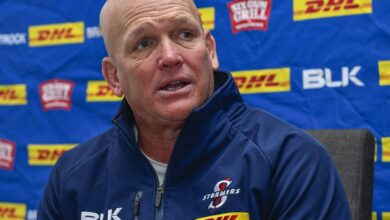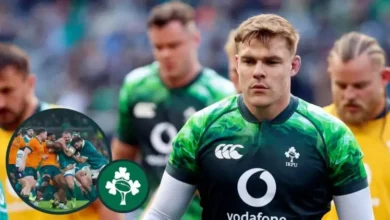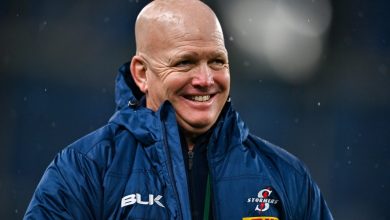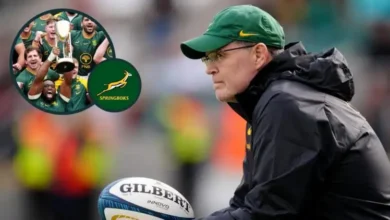Springboks require a major rebuild, but how ruthless will Rassie Erasmus be?
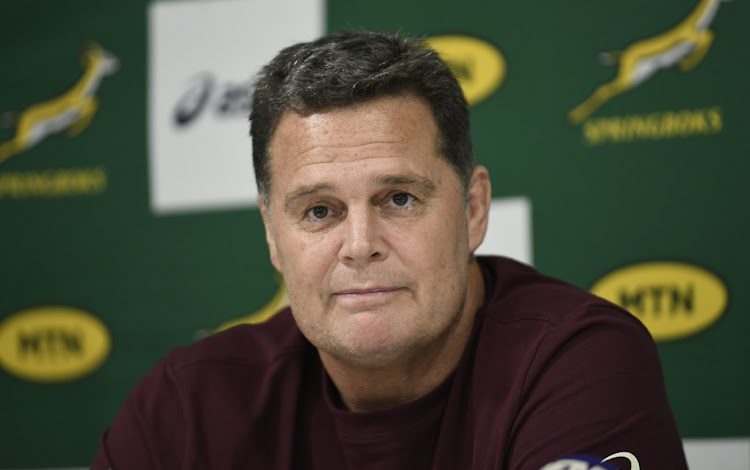
As he returns to his role as head coach, Rassie Erasmus has a telling task to rebuild the Springboks squad as the new generation gets ushered in.
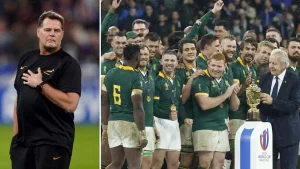
Though most international rugby tournaments last four years, some prove to be more important than others, and this one definitely qualifies for South Africa.
With their most seasoned squad ever picked in the final, the Springboks became just the second country to win the Rugby World Cup twice in a row.
Of the 35 World Cup champions in 2023, 22 were involved in the Rugby World Cup victory in 2019, and just one player—Duane Vermeulen, who started at number eight in both finals—has formally announced his retirement from the game after the success in France.
Changes needed
This will inevitably create some tough conversations for returning head coach Erasmus, who takes on the role following Jacques Nienaber’s tenure in charge.
Since Erasmus and Nienaber returned to take control of the squad following Allister Coetzee’s sacking, they have had a consistent core of players through the eight years. When fit, the likes of Steven Kitshoff, Malcolm Marx, Frans Malherbe, Willie le Roux, Siya Kolisi, Eben Etzebeth, Pieter-Steph du Toit, Franco Mostert and Damian de Allende have been regularly picked in the squad and in the matchday 23s.
However, this will need to change in the coming four years as many of those players head into their 30s or, in some cases, are already in them. Sure, the improvements in strength and conditioning and player welfare since the game has gone professional have meant that many players have extended their careers deep into the 30s, but unfortunately, not all will be able to do so and still maintain a high standard.
The Boks will be aiming to have a similar age and international experience profile for the tournament in Australia in four years’ time.
Erasmus himself understands this, stating as much in a recent interview with Rapport.
“He [Eben Etzebeth] is so athletic, but I don’t know if he still has another World Cup in him,” Erasmus said, as he admitted that the Springboks have got to address the depth in certain positions in their squad.
Erasmus will be wary of falling into the same trap that former head coach Heyneke Meyer did during his tenure between 2012 and 2015. Meyer regularly selected the experienced campaigners and did not sufficiently blood through the next generation until injuries forced his hand.
Thirteen of the thirty-five players who played for the Springboks in the World Cup are 30 years of age or older, and nine more are 29 or 28.
Even while a World Cup team can include a few veterans who are well into their 30s, having too many of them can hurt the team.
Several of those nine players, who are 28 or 29 years old, might still be at the top of their game by the time of the 2027 World Cup and could end up being key players for the team in the coming years. However, Erasmus’s biggest test will come in deciding when to make a pick and engage in the difficult talks with some of those individuals.
New faces in the pack
Deon Fourie had a sensational World Cup, but at 37, his international career may be a short one as South Africa builds more depth at hooker and starts bringing through their talented back-rowers.
In the URC squads, South Africa has a number of promising prospects at hooker. While Marx (29) still has time on his side, Bongi Mbonambi (32) may not, as the Boks will need to gain experience for players like Joseph Dweba, Johan Grobbelaar, and others.
At the 2023 World Cup, Ox Nche (age 29), the only Bok prop under 30, stayed in the front row. While players like Kitshoff (31) and Malherbe (32) could be able to qualify for another World Cup, it would be unfavorable to continue with them, Vincent Koch (33) and Trevor Nyakane (34) after 2027.
Erasmus noted in that interview that they will need to build lock depth in the coming years, having noted that Etzebeth may not make another World Cup. Whether he does or not, RG Snyman was the only second-rower under 30 years old – also including regular starter Lood de Jager. Salmaan Moerat is a long-term option for the side and a possible future captain.
Kolisi hinted in his autobiography that he might hang up his boots after the World Cup but has since confirmed that he will still make himself available for selection when he links up with Racing 92.
This is possibly Erasmus’ biggest call, as the inspirational 32-year-old captain may not be the man to lead the side by the next tournament. There is no doubting his quality, particularly his leadership, but Kolisi has had some serious injuries during his career. The same applies to the sensational Du Toit (31).
Jasper Wiese and Marco van Staden provide the Boks with great options in the back-row going forward, but will that be the case for 30-year-old Kwagga Smith, too?
With Handre Pollard and Manie Libbok in the ideal age range to play in a fourth and second World Cup, respectively, the future of the half-back positions appears to be in strong hands. Jaden Hendrikse and Grant Williams appear ready to take over the scrum-half responsibilities for the team moving ahead.
In actuality, the majority of the new faces will need to show up in the Springbok pack. Rising sensation Sacha Feinberg-Mngomezulu of the Stormers is sure to have a lengthy career in green and gold and compares favorably with Damian Willemse, who has already won two World Cups at the age of just 25.
Sooner or later?
Regarding Le Roux (34) and Makazole Mapimpi (33), Erasmus will undoubtedly need to make a decision sooner rather than later, but the issues with Cheslin Kolbe (30) and De Allende (31) are less urgent.
With fellow centers Lukhanyo Am and Jesse Kriel the same age as Esterhuizen, the Boks have a ready-made successor in Andre Esterhuizen (29), specifically for De Allende. Canan Moodie is still only 21 years old, so the midfield is still in excellent shape, and young players like Henco van Wyk and Feinberg-Mngomezulu are already vying for a spot on the roster.
A complete and immediate overhaul in year one is not a necessity for the Springboks to build on their success over the past eight years, but Erasmus will be aware that the ageing squad does need to be freshened up.
Maybe he will use his first year back in complete command as a benchmark to evaluate many of the thirty-plus players and choose matchday teams, akin to how he tested players in the 2018 and 2022 matches against Wales.
There are undoubtedly options available to him. Elrigh Louw, Evan Roos, Francke Horn, and other players are vying with Wiese to take Vermeulen’s place. Thomas du Toit, Wilco Louw, and Ntuthuko Mchunu are all desperate for a longer stint in the Boks team.
The squad is even more excited about the upcoming cycle since there are prospects strewn across the URC teams in South Africa and elsewhere, just waiting to be brought to the big stage.

